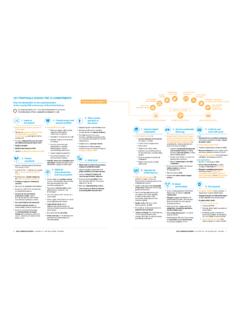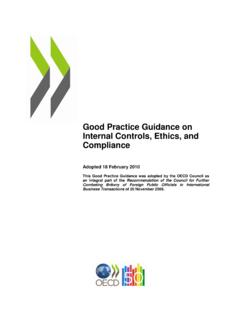Transcription of Governance, corruption, and conflict
1 A study guide series on peAce And conflictfor independent leArners And clAssroom instructorsGovernance, corruption , and conflictUn i t e d St a t eS in S t i tU t e o f Pe a c eWashington, Guide Series on Peace and conflict 1 Governance, corruption , and conflict Table of Contents Preface 2 Introduction 4 corruption 4 corruption , Society, and Governance 9 corruption , conflict , and Peacebuilding 16 Conclusion 22 Glossary 23 Discussion and Investigation Activities 27 Discussion I: Introduction to Governance and corruption 27 Discussion II: Identifying corruption and the Role of Governance in conflict 28 Activity I: Analyzing Recommendations 29 Activity II: Simulation 31 Resources 44 Notes 50 3.
2 Study Guide Series on Peace and conflict 2 Governance, corruption , and conflict Preface The international system has witnessed dramatic changes in the recent past. Questions relating to how and when ordinary citizens can stand against oppression, injustice, and abuse without resorting to violence challenge all of us to rethink our understanding of international peace and conflict . As academicians, educators, practitioners, private citizens, and students, what is our role in this increasingly complex global picture? What can we do to nurture and preserve international security and world peace? One thing is certain. We must make sure our learners and educators have access to the best available information about the issues surrounding peace, justice, freedom, and security.
3 Our country s future depends upon their interest in and understanding of these complicated topics. In the belief that knowledge of these issues is vital to civic education, we have developed this study guide to expand our readers perspectives and knowledge of some aspects of international peace and conflict . About the Study Guide This study guide is designed to serve independent learners who want to find out more about international conflict and its possible resolution, as well as educators who seek to introduce these topics into their curricula. The main text of each guide briefly discusses the most important issues concerning the subject at hand, especially those that are related to the critical task of managing conflicts and building international peace.
4 Other features of each study guide include: A glossary to help the reader build vocabulary essential to the discussions about the topic. Discussion questions and activities to encourage critical thinking and active learning. A list of readings and multimedia resources for additional investigation and learning opportunities. It is our hope that citizens around the world will find the contents of the study guide useful as they strive to deepen their understanding of international peace and conflict . 2010 by the Endowment of the United States Institute of Peace. All rights reserved. I Miss Mao by Xiao Chi An "I have good news," Fan Xiaoli told her brother, Fan Dayi, on the phone one day in August 2008 (the family's names have been changed).
5 "I've finally found someone who can help us to send Yuanyuan to the school." They were talking about how to get Yuanyuan, Fan Xiaoli's daughter, into a prestigious junior high school in Guangzhou, China. When test results were released in mid-July, Yuanyuan did not do well enough to meet the school's entrance requirements. Xiaoli was as disappointed as her daughter. She then decided, as many Chinese people in the same situation do, to try to find someone who could help. Through a colleague, she got to know a Mr. Yang, who claimed to know "some decision-maker in government" and said he could help get the girl admitted to the school if Xiaoli paid him 70,000 yuan (US$10,257). "I know it is corruption ," Xiaoli said, "but it works and everybody is willing to do it if they can afford the money.
6 " She paid the money and by mid-August, Yuanyuan got an offer from the school. "It is not so bad a deal for my sister because she wants her daughter to go to the school and she can afford the money," Fan Dayi said, "but it is sad for the people in this country. There is too much corruption . Nominally, we have all kinds of laws, regulations and responsible officials, but in reality, only money and guangxi (nepotism or relations) work when people want something done in this society." The corruption Notebooks, 2008 Global Integrity This guide is a brief summary of the key issues surrounding the issue of governance and corruption . Please do not use the guide as a reference in your essay or as a bibliographic citation. We encourage you to consult the references listed in the resource section and in the notes.
7 These resources may be included as references in your bibliography. Study Guide Series on Peace and conflict 3 Governance, corruption , and conflict About the United States Institute of Peace The United States Institute of Peace is an independent, nonpartisan institution established and funded by Congress. Its goals are to help prevent and resolve violent conflicts, promote post- conflict peacebuilding, and increase conflict management tools, capacity, and intellectual capital worldwide. The Institute does this by empowering others with knowledge, skills, and resources, as well as by its direct involvement in conflict zones around the globe. Board of Directors J. Robinson West (Chair), Chairman, PFC Energy, Washington, George E.
8 Moose (Vice Chair), Adjunct Professor of Practice, The George Washington University, Washington, Anne H. Cahn, Former Scholar in Residence, American University, Washington, Chester A. Crocker, James R. Schlesinger Professor of Strategic Studies, School of Foreign Service, Georgetown University, Washington, Kerry Kennedy, Human Rights Activist Ikram U. Khan, President, Quality Care Consultants, LLC., Las Vegas, Nev. Stephen D. Krasner, Graham H. Stuart Professor of International Relations at Stanford University Jeremy A. Rabkin, Professor of Law, George Mason University, Arlington, Va. Judy Van Rest, Executive Vice President, International Republican Institute, Washington, Nancy Zirkin, Executive Vice President, Leadership Conference on Civil Rights, Washington, Members Ex Officio James N.
9 Miller, Principal Deputy Under Secretary of Defense for Policy Michael H. Posner, Assistant Secretary of State for the Bureau of Democracy, Human Rights and Labor Ann E. Rondeau, Vice Admiral, Navy; President, National Defense University Richard H. Solomon, President, United States Institute of Peace (nonvoting) Contact United States Institute of Peace Education and Training Center/ Domestic Programs 1200 17th Street NW Washington, DC 20036 Study Guide Series on Peace and conflict 4 Governance, corruption , and conflict Introduction The international community has been paying increasing attention to corruption and how to control it. For one thing, international institutions, governments, donors, aid workers, and peacebuilders all realize that corruption has very high costs for society, but particularly in states emerging from conflict .
10 Not only can corruption keep states in cycles of violence by funding armed groups and criminal networks, but it can also prevent the development of effective institutions of governance. When money and resources available to government are diverted by corrupt officials instead of being channeled for the benefit of citizens, the clock turns back on social and economic development. This, in turn, can create further instability. In these ways, corruption , governance, and conflict are all linked. But, corruption exists everywhere in some form and can be pervasive in some societies. Rooting it out is more difficult than it would seem. corruption What Is corruption ? Almost everyone who studies it would agree that corruption is difficult to define and nearly impossible to measure.


















